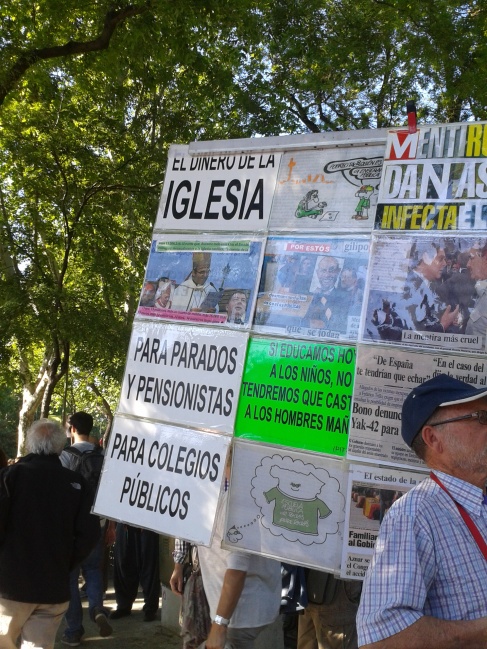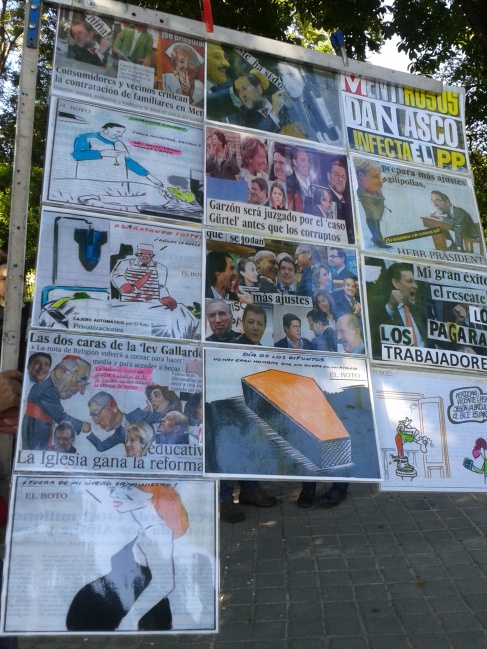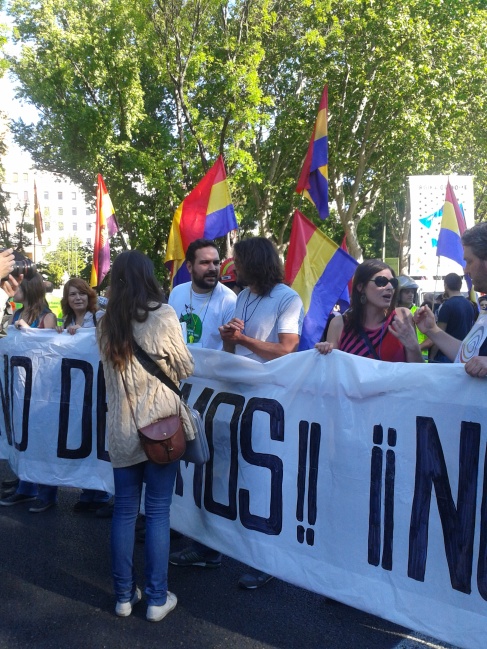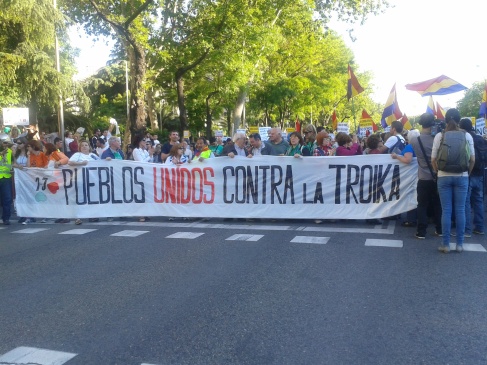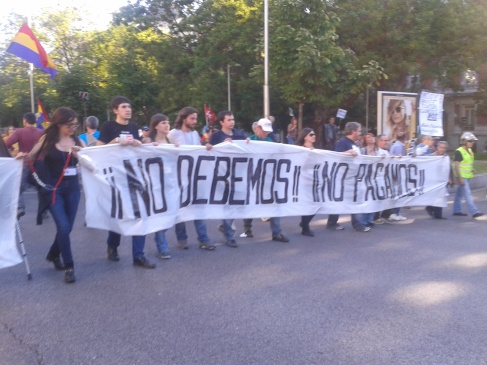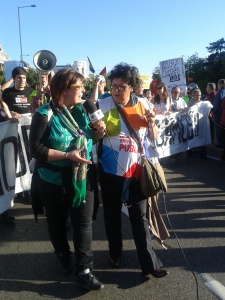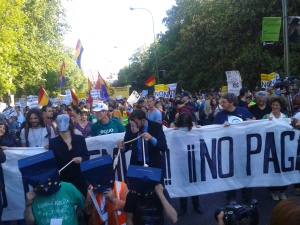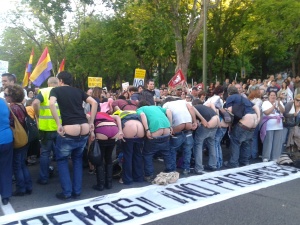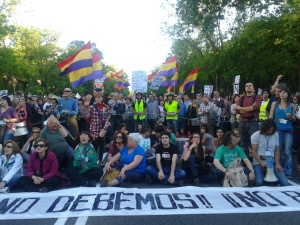Today, Syrian professor Mohamed Abdulrahim and pianist Malek Jandali attended to the University Carlos III of Madrid to talk to the students about the conflict in their country and the role of music and arts in that environment. The lecture was hosted by UC3M professor and human rights activist Leila Nachawati. The hashtag used during the talk on Twitter was #FreeSyriaFromUc3m, where you’ll be able to find all the information shared during their visit.
Professor Abdulrahim got his Bachelor of Arts degree from the Damascus Music Conservatory in 1995. Since then, his career as a musician has been growing, travelling around the world. You can get more information about him on his website alsiadi.com.
During the talk, he said that in Syria, intellectuals go to jail or are executed if they refuse to obey the government, which imposes how much and how to work: always in its benefit. This way, their culture is under the influences of the government, a fact that destroys arts and the identity of Syrians.
The professor wanted to highlight the fact that mainstream media do not cover the Syrian war. He illustrated this with the massacre of Hama in 1982, when the president Hafez al-Asad killed between 20,000 and 40,000 civilians in less than a month, during a period of revolts against his mandate. Again, this event was not given coverage by media.
In 2011, the Arab uprising started. As Abdulrahim stated, Bashar al-Assad, the Syrian dictator, knew how to fight them through money and power. People who went back to their country after having left to be around the world and brought new ideas were executed and, in many cases, nowadays they still do no know anyting about them. The professor, as a current citizen of the US, also complained about the fact that they pay taxes to know the truth but, unfortunately, they do not get to know it.
Moreover, he added that, currently, Syrians have no dignity and no rights. They cannot be called citizens. 8,000,000 of them are being fed by the population itself, not by the United Nations, as it should be. Thousands of people are being killed everyday and, however, “we are more worried about a missing airplane”.
Abdulrahim warned the students that they “must stop the killing of people in Syria” because they are the intellectual future. As a datum, he stated that the majority of the victims of the Bashar’s mafioso army are women and children. Journalists are being killed because they are looking for the truth.
Then, Malek Jandali, after presenting his music video Freedom Qashoush Symphony, asked for a minute of silence in memory of all the children killed by the Syrian regime.
“Can you imagine a world without letters and music notes?”, asked in the beginning of his talk. It tourns out that Syrians invented them. Thanks to them, we have Mozart’s and Beethoven’s music. Without those people, we could only communicate verbally and we could not write music. Ironically, now they cannot these elements freely in their country because their government is in charge of manipulating and censoring it, while they also bomb museum, universities, hospitals, mosques, churches, schools, kindergartens… And this is not even on news.
As a concrete example of these barbalities, he also told the anecdote of the war correspondent Marie Colvin, who lost her eye in Sri Lanka while she was covering the civil war in 2001. After this tragedy, she did not decide to stay at home and instead went to Syria in 2010 to speak the truth about what was going on in the country. But she almost did not have time. She was killed. Killed within the borders of the country condemned to be ruled by Bashar al-Assad. She was killed by the government because “she was looking for humanity, music, freedom,, dignity. She sacrified her life for beauty and truth“, as said by Jandali. He met the journalist’s mother at her funeral and, surprisingly, she said that she was good because her daughter “died happily, doing what she loved to do”.
Jandali said during his talk that he considered himself “a hypocrit” because he was “a product of a dictatorship”. When he went to school, he had to state several times a day, after listening to the Syrian anthem while standing up, “I sacrifice my life and my blood to Assad”. However, his parents told him not to say so because Assad was not a good man, so in the musician’s mind there was a mess of love-hate-love-hate and evil-good-evil-good. “Imagine that you get an A+ just for saying so and lying!”, he said. This causes a destruction of morality.
After the massacre of Hama, Jandali composed a song I’m my homeland to “clean his brain from all the pollution that covered his country in that moment”. When people asked him about his actual homeland, he never said “Syria” because he really feared for his life. When he performed in the White House, his parents got hurt by the regime in their own rooms because of his son: two people related to al-Assad beat them for half an hour, even breaking their teeth.
“We want peace, harmony, human rights, justice. The end of war that has been launched by the regime. It is not a political issue; it’s humanity“, the musician stated. People in the streets scream “give me liberty or give me death”, and all the government is giving them is death. But, according to them, at least “they are dying free”. “Children are dying slowly from starvation. It is the most inhumane thing in the world.” 12,000 children have been massacred in Syria for no reason: they are Christian, Muslim, atheists… “It doesn’t matter if they are 150 or 15,000, because we are not numbers, we are people”, the pianist said. “Syrians are asking for human rights and the government divides the population to fight each other while they just watch and call for Russian airplanes to bomb them. This way, they make the world forget about the original demands and focus the attention on the war. The regime turns a revolution into a civil war“.
When asked why media do not report about this issue, Jandali answered that “the dictatroship pays billions of dollars to fake journalists, fake artists, and a fake army. This government has created fictitious messep up people because they want to create this fake war”. However, he believes strongly that “the power of people is much stronger than the people in power” and that the solution to conflicts are students, encouraging them to use their own tools to help the Syrian population, as he does with his music.
Malek Jandali is performing next Saturday the 5th in the Auditorio Nacional of Madrid to unite people’s voices for Syrian children. It is a charity concert together with the Iuventas orchestra. They want to “give hope” and “take pain up again” through music. The fundraising will be aimed to help Syrian children through Mensajeros de la Paz. You can click on this link to buy the concert tickets.

